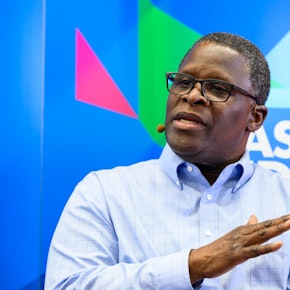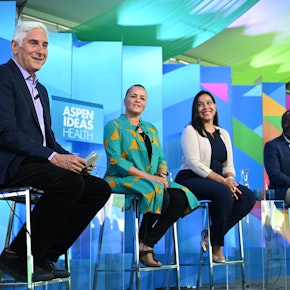USA
Race

Much of the public discourse around race and our national narrative is, perhaps understandably, filled with recrimination, but if Americans are to remain a nation, we must find a way to reckon with history and chart a path forward. Join two renowned historians for a conversation about how we might do just that.

Join us for a discussion with leaders who are on a path of racial healing personally and organizationally as they explore what happens when communities cross divides, engage in difficult conversations, and take transformative action toward a better future. Presented by W.K Kellogg Foundation with NBCUniversal News Group

Join W.K. Kellogg Foundation and racial-healing practitioners for a discussion on how to have sensitive conversations about race so that everyone feels seen, heard, respected, and welcome to participate. This session will help participants examine the impacts of racism, individually and collectively, while considering what it takes to create a shared vision for an equitabl...

If Black women bear the heaviest burdens of the maternal mortality crisis—they are 2.6 times more likely to die during pregnancy or shortly after childbirth—they are also the most determined to address it. Moving beyond grief and rage, their leadership is prioritizing culturally sensitive care, respect for best practices, and greater use of community-based models and licen...

No one is immune from the catastrophic storms, wildfires, heat waves, and drought that accompany climate change, but the risks are far greater for some populations than for others. Unstable housing, food insecurity, inadequate access to care, lack of tree canopy, and proximity to toxic emissions and other environmental hazards all intensify the health consequences. People...

Eighty percent of what impacts our health happens outside of the doctor's office: from education and employment opportunities to access to housing, transportation, and quality food. A panel of global experts will explore actionable solutions to address the root causes of disparities and how to build a path forward for collaboration, community co-creation, and a shared visi...

What is racial healing? This conversation between NBC News correspondent Yamiche Alcindor and the W.K. Kellogg Foundation’s La June Montgomery Tabron highlights the growing impact of racial healing and explores how this practice is at the heart of our journey to racial equity. We’ll candidly discuss recent headlines — the killing of George Floyd and the energy it mobilized...

Hate takes many insidious forms: as a mass shooting targeting a Black community, as an antisemitic remark, as a wave of anti-Asian violence. Intolerance and hate crimes have spiked in recent years, and experts, activists, and community members themselves are working hard not only to quantify the problem but to find actionable solutions. What does it take to stop hate in co...

Beyond the everyday policy disagreements that have typically characterized Americans from blue states and red states, we seem more divided than ever about the fundamental direction of our nation. For the first time since the Civil War, our political disagreements erupted into violence at the US Capitol. And the pandemic has only made things worse, as our differences became...

In its landmark 2002 study, Unequal Treatment, the Institute of Medicine (IOM) stated bluntly that racial and ethnic minorities receive lower-quality health services than white Americans. Two decades after the IOM called out structural racism, the devastating toll remains apparent in the uneven risks associated with COVID, diabetes, asthma, cancer, stroke, and pregnancy. P...

No doctor awakens in the morning determined to discriminate against patients of color, yet their daily clinical decisions too often have that result. Implicit bias—unconscious assumptions and stereotypes—often cause the harm. The failure to ask the right questions, listen closely and reserve judgment can sabotage communication in any patient/physician encounter, but it wor...

From the skewed impact of climate change on the nations that have contributed least to the problem to financing mechanisms that allow primary care services to languish in the poorest countries, inequitable patterns in global health and development are all too evident. To radically reimagine healthcare systems, we need to acknowledge lingering colonialism and commit to exti...

America’s robust biomedical ecosystem and the therapeutic advances it has introduced are making remarkable progress against cancer, heart disease, stroke, and other serious illnesses. But much more needs to be done to ensure that all communities can access the treatments and care they need. Prohibitive costs, ingrained biases, healthcare deserts, and distrust in the medica...

With the power of a text message, the advice of a health worker fits in the palm of your hand. With innovative entrepreneurship, care becomes accessible where it previously was not. With the skill of a midwife, the pregnant woman in need of a champion thrives. Health systems may be complex, but what powers them is simple—the human beings at their backbone who are critical...

Martin Luther King Jr. said: “We are not makers of history. We are made by history.” As Americans of all backgrounds continue to grapple with the legacy of slavery, its imprint on our lives remains indelible. This conversation brings together two scholars and poets contemplating how the nation’s monuments and landmarks tell — and shape — not only our collective memory, but...

Charles Adams, a 20-year Minneapolis police officer, built a powerhouse football program at North High, in one of the city’s toughest neighborhoods. With a group of cop-coaches, they forged a bond with the community on the way to the state championship. But winning didn’t resolve the conflict of being black and blue, magnified when Adams was called to the front lines in th...

In the year plus since the murder of George Floyd and the global outcry for racial justice, much has changed in the world. And yet, systemic racism still casts its long shadow on many aspects of our lives. Join PayPal CEO Dan Schulman and Shartia Brantley to discuss the economic underpinnings of racial injustice and the investments that leaders across the ecosystem can mak...

The emotionally charged trial of Derek Chauvin for the murder of George Floyd was a milestone case in a country whose legal system has historically been resistant to convict officers for alleged abuses. What did it take to break the blue wall of silence, the informal code among police officers protecting their own? Is it possible to get a fair trial and an impartial jury w...

Born into slavery, Frederick Douglass learned to read against the odds, succeeded in a harrowing escape from bondage, and went on to bear witness to its evils across the country. By the outbreak of the Civil War, he had become perhaps the most famous orator in the nation — charismatic, eloquent, and a unique combination of fierce critic of his country and radical patriot....

Criminal justice reform is gaining momentum across the country in the hope of turning the page on the era of mass incarceration. But even the best possible laws must be carried out by humans. Implicit racial, religious, and gender biases, confirmation bias, tunnel vision, and myriad other human psychological foibles make objectivity all but impossible. Add to the mix the o...

